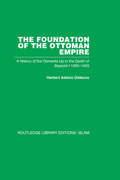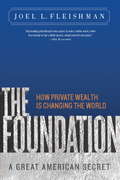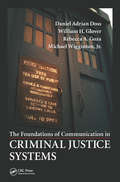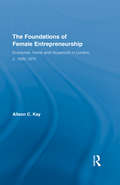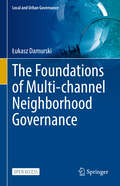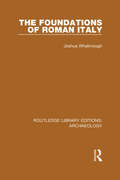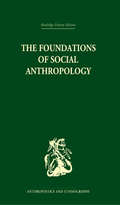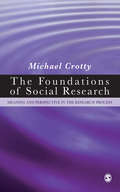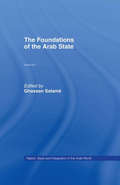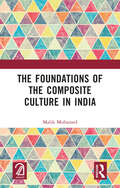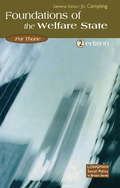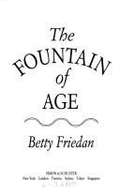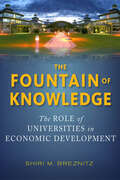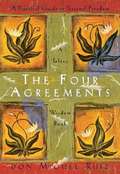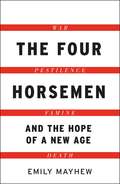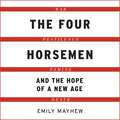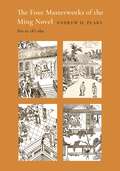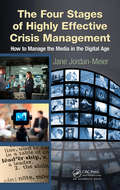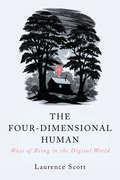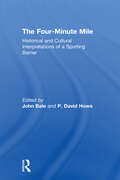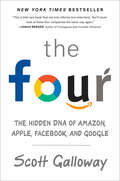- Table View
- List View
The Foundation of the Ottoman Empire: A History of the Osmanlis Up To the Death of Bayezid I, 1300-1403
by Herbert Adam GibbonsOriginally published in 1916, this work provides a detailed study of the first century of the Ottoman Empire. It traces the life and career of Osman himself and of his descendants, Orkhan, Murad and Bayezid, who laid the foundations of the Ottoman Empire.
The Foundation: A Great American Secret; How Private Wealth is Changing the World
by Joel FleishmanPrivate foundations have been the dynamo of social change since their invention at the beginning of the last century. Yet just over 10 percent of the public knows they even exist; and for those who are aware of them, as well as even those who seek grants from them, their internal workings remain a complete mystery. Joel Fleishman knows the sector like few others, and in this groundbreaking book he explains both the history of foundations?with their fledgling beginnings in the era of the robber barons seeking social respectability?through to the present day. This book shows how, why foundations matters, and how the future of foundations can provide a vital spur to the engine of the American, and the worldOCOs, economy?if they are properly established and run. "
The Foundations of Anti-Apartheid
by Rob SkinnerAnti-apartheid was one of the most significant international causes of the late twentieth century. The book provides the first detailed history of the emergence of anti-apartheid activism in Britain and the USA, tracing the network of individuals and groups who shaped the moral and political character of the movement.
The Foundations of Communication in Criminal Justice Systems
by Daniel Adrian Doss Michael Wigginton Jr. William H. Glover Jr. Rebecca A. GozaMyriad forms of communication occur within the criminal justice system as judges and attorneys speak to juries, law enforcement officers interact with the public, and the news media presents stories of events in courtrooms. Hindrances abound, however. Law enforcement officers and justice system personnel often encounter challenges that affect their
The Foundations of Female Entrepreneurship: Enterprise, Home and Household in London, c. 1800-1870 (Routledge International Studies in Business History)
by Alison KayThe Foundations of Female Entrepreneurship explores the relationship between home, household headship and enterprise in Victorian London. It examines the notions of duty, honor and suitability in how women’s ventures are represented by themselves and others and engages in a comparison of the interpretation of historical female entrepreneurship by contemporaries and historians in the UK, Europe and America. It argues that just as women in business have often been hidden by men, they have often also been hidden by the ‘home’ and the conceptualization of separate spheres of public and private agency and of ‘the’ entrepreneur. Drawing on contextual evidence from 1747 to 1880, including fire insurance records, directories, trade cards, newspapers, memoirs, the census and extensive record linkage, this study concentrates on the early to mid-Victorian period when ideals about gender roles and appropriate work for women were vigorously debated. Alison Kay offers new insight into the motivations of the Victorian women who opted to pursue enterprises of their own. By engaging in empirical comparisons with men's business, it also reveals similarities and differences with the small to medium sized ventures of male business proprietors. The link between home and enterprise is then further excavated by detailed record linkage, revealing the households and domestic circumstances and responsibilities of female proprietors. Using both discourse and data to connect enterprise, proprietor and household, The Foundations of Female Entrepreneurship provides a multi-dimensional picture of the Victorian female proprietor and moves beyond the stereotypes. It argues that active business did not exclude women, although careful representation was vital and this has obscured the similarities of their businesses with those of many male business proprietors.
The Foundations of Multi-channel Neighborhood Governance (Local and Urban Governance)
by Łukasz DamurskiThe book presents various aspects of the current urban development in the context of the recent rapid growth of the ICT sector. It focuses on the local scale, in line with the notion that the neighborhood is the fundamental component of any urban area. Beginning with a critical overview of the urban governance paradigms, through a careful analysis of the multifaceted relationships between the Internet and the urban functions, followed by a description of selected approaches to local urban spatial policy, it concludes with a concept of multi-channel neighborhood governance (MCNG). The key observation is that the accelerating virtualization of urban life has profound consequences for the spatial, social, and economic structures of cities. At the local level, it is changing the functional profile of neighborhoods, replacing some traditional on-site local services with online ones, reducing (or even eliminating) the need for face-to-face social interaction, rejoining work and home roles, and modifying the spatial behaviors of residents. All of this calls for a prompt response from the neighborhood governance, which should include the nonspatial (online) components of contemporary urban lifestyles. The book searches for an alternative to conventional planning, capable of addressing the virtualization of different urban functions at the neighborhood level and providing satisfactory solutions for shaping an optimal balance between online and offline environments. The study defines a comprehensive method for the management of essential services in urban neighborhoods, with special attention to the integration of online and offline channels. The MCNG concept includes a list of recommendations for urban policy practitioners on how to deal with digital conversion, how to manage land use, how to stimulate entrepreneurship, and how to improve quality of life.
The Foundations of Organizational Evil
by Carole L. JurkiewiczNumerous reprehensible corporate, governmental, and nonprofit activities over recent years have highlighted the existence of organizational evil. Unlike other works on the topic, this book fully develops the concept of organizational evil, conceptually weaving the interchange between evil individuals (microlevel) who ultimately create the organizational environment that is evil, and the macrolevel elements of policy, culture, and manipulations of the social environment.
The Foundations of Roman Italy (Routledge Library Editions: Archaeology)
by Joshua WhatmoughThis book presents a picture of pre-Roman Italy as complete and as faithful as modern discovery could make it, when it was originally published in 1937. The evidence of archaeology is combined with the testimony of historical tradition and non-Latin dialects in a balanced account of elements no less diverse than those of modern Europe. This description of Italy in the middle of the last millennium B.C. illuminates the success of Rome in achieving a united Italy, where others had failed – an achievement which paved the way for the course over of events over centuries.
The Foundations of Social Anthropology
by S.F. NadelFocussing on the methodology of social anthropology this book covers the following: · The aims of social anthropology · Observation and description · Psychology in observation · The material of observation · Institutions · Groupings · Explanation · Experimental anthropology · Psychological explanations · Function and pattern. Originally published in 1951
The Foundations of Social Research: Meaning and Perspective in the Research Process (Social Research Practice Ser.)
by Michael CrottyChoosing a research method can be bewildering. How can you be sure which methodology is appropriate, or whether your chosen combination of methods is consistent with the theoretical perspective you want to take? This book links methodology and theory with great clarity and precision, showing students and researchers how to navigate the maze of conflicting terminology. The major epistemological stances and theoretical perspectives that colour and shape current social research are detailed and the author reveals the philosophical origins of these schools of inquiry and shows how various disciplines contribute to the practice of social research as it is known today.
The Foundations of the Arab State
by Ghassan SalaméThe Foundations of the Arab State deals with the conceptual, historical, and cultural environment in which the contemporary Arab state system was established and has evolved. With contributions from established scholars in the field, this volume addresses the major issues posed by the emergence of contemporary Arab states, by their consolidation, the role played by foreign powers in their creation, and their future within the region.
The Foundations of the Composite Culture in India
by Malik MohamedIn The Foundations of the Composite Culture in India, the focus of the author is the process of establishment of Hindu-Muslim unity as a result of historical, social and cultural factors over a period of ten centuries. Traversing this era, he reveals how the Muslim rulers contributed to such harmony and how the two cultures exchanged and accepted each other's tenets to enrich and formulate a composite Indian culture. To explore the foundations on which the complex culture of India rests, the author examines the contribution of Sufism which inherently connotes syncretism and tolerance, as well as the simultaneous rise of the Bhakti movement in medieval India. This title is co-published with Aakar Books. Print editions not for sale in South Asia (India, Sri Lanka, Nepal, Bangladesh, Pakistan and Bhutan)
The Foundations of the Welfare State (Longman Social Policy In Britain Series)
by Pat ThaneA fully revised and rewritten second edition of a book which is now regarded as a classic. Takes full advantage of new research and places strong emphasis on voluntary action and the role of women in the shaping of social policy.It retains the excellent historical perspective that makes it unique among its competitors, comparing recent policy changes to pre-1950 welfare policy.
The Fountain of Age
by Betty FriedanBetty Friedan launches a new revolution with this powerful, bestselling book breaking through the American mystique of aging as decline. Through hundreds of interviews, Friedan confronts our denial and demolishes society's compassionate contempt -- to offer a vision of what can be embraced.
The Fountain of Knowledge: The Role of Universities in Economic Development
by Shiri M. BreznitzToday, universities around the world find themselves going beyond the traditional roles of research and teaching to drive the development of local economies through collaborations with industry. At a time when regions with universities are seeking best practices among their peers, Shiri M. Breznitz argues against the notion that one university's successful technology transfer model can be easily transported to another. Rather, the impact that a university can have on its local economy must be understood in terms of its idiosyncratic internal mechanisms, as well as the state and regional markets within which it operates. To illustrate her argument, Breznitz undertakes a comparative analysis of two universities, Yale and Cambridge, and the different outcomes of their attempts at technology commercialization in biotech. By contrasting these two universities—their unique policies, organizational structure, institutional culture, and location within distinct national polities—she makes a powerful case for the idea that technology transfer is dependent on highly variable historical and environmental factors. Breznitz highlights key features to weigh and engage in developing future university and economic development policies that are tailor-made for their contexts.
The Four Agreements: A Toltec Wisdom Book
by Miguel RuizThe 4 Agreements: Be impeccable with your word, don't take anything personally, don't make assumptions, and always do your best.
The Four Horsemen
by Emily MayhewThe Four Horsemen - War, Pestilence, Famine and Death - first appeared in the Book of Revelations a thousand years ago, but they continue to track us in our own time. This original and inspiring study bycelebrated historian Emily Mayhew traces the advances in science, technology and humanitarianism that are enabling us to take them on, one by one.'The beauty of The Four Horsemen is how she takes her quaking readers to the edge of the abyss . . . I was left moved and uplifted . . . [A] first-class example of popular science' The Times'[A] thoughtful and ultimately uplifting analysis of the unsung heroes of our age' IndependentIt begins in Mosul, our oldest surviving city, and the extraordinary coalition created in a matter of days to save its people from the worst horrors of the liberation battle against ISIS. As the city and the humanitarian operation that helped it to survive are restructured for a new age, Mayhew shows other people whose work gives us hope for the future, from the search to find new ways to discover and use antimicrobial medicines and the innovations in preventing the spread of deadly viruses; the laboratory work being taken to protect crops from disease and reduce famine, and why the potato, not the banana is the future; to the unique courage and resolution of those dedicated to securing the rights of the dead and their families. Standing in the way of the Horsemen is what Emily Mayhew calls, 'the most extraordinary alliance ever to come together in defence of our humanity.' These are the doctors, scientists, statisticians, engineers, peace negotiators, pharmacists, historians, forensic scientists, vaccinators and volunteers who are creating solutions to life and death problems which threaten us all. They are the new heroes of our age and this book is about them.
The Four Horsemen
by Emily MayhewThe Four Horsemen - War, Pestilence, Famine and Death - first appeared in the Book of Revelations a thousand years ago, but they continue to track us in our own time. This original and inspiring study bycelebrated historian Emily Mayhew traces the advances in science, technology and humanitarianism that are enabling us to take them on, one by one.'The beauty of The Four Horsemen is how she takes her quaking readers to the edge of the abyss . . . I was left moved and uplifted . . . [A] first-class example of popular science' The Times'[A] thoughtful and ultimately uplifting analysis of the unsung heroes of our age' IndependentIt begins in Mosul, our oldest surviving city, and the extraordinary coalition created in a matter of days to save its people from the worst horrors of the liberation battle against ISIS. As the city and the humanitarian operation that helped it to survive are restructured for a new age, Mayhew shows other people whose work gives us hope for the future, from the search to find new ways to discover and use antimicrobial medicines and the innovations in preventing the spread of deadly viruses; the laboratory work being taken to protect crops from disease and reduce famine, and why the potato, not the banana is the future; to the unique courage and resolution of those dedicated to securing the rights of the dead and their families. Standing in the way of the Horsemen is what Emily Mayhew calls, 'the most extraordinary alliance ever to come together in defence of our humanity.' These are the doctors, scientists, statisticians, engineers, peace negotiators, pharmacists, historians, forensic scientists, vaccinators and volunteers who are creating solutions to life and death problems which threaten us all. They are the new heroes of our age and this book is about them.
The Four Horsemen
by Emily MayhewIn lucid and energised prose, Emily Mayhew summons the four horsemen of the apocalypse; the collective threat to humanity bearing the names of war, pestilence, famine and death. As they began in Revelations and have remained in human consciousness ever since, spanning time and space and evolving as new scientific discoveries and advancements in technology alter the world.(P)2021 Quercus Editions Limited
The Four Masterworks of the Ming Novel: Ssu ta ch'i-shu
by Andrew H. PlaksA reinterpretation of some of the great works of Chinese fiction of the late Ming dynastyIn this book, Andrew Plaks reinterprets the great texts of Chinese fiction known as the &“Four Masterworks of the Ming Novel&” (ssu ta ch'i-shu). Arguing that these are far more than collections of popular narratives, Plaks shows that their fullest critical revisions represent a sophisticated new genre of Chinese prose fiction arising in the late Ming dynasty, especially in the sixteenth century. He then analyzes these radical transformations of prior source materials, which reflect the values and intellectual concerns of the literati of the period.
The Four Questions
by Lynne Sharon SchwartzWhy is this night different from all other nights?Every year when families gather for the Passover holiday, the youngest child poses that question as part of the poetic Four Questions near the start of the Seder. The answers are no less than the story of a people bound in slavery, their suffering in a foreign land, and their ultimate liberation – the story of Passover.Here the Four Questions are presented in breathtakingly luminous paintings by Ori Sherman. Whimsical animals parade through a unique format that can be read straight through in English or turned upside down to focus on the delicate Hebrew calligraphy and ingenious split-frame pictures. Each side of the Seder table can see its own variation of the richly colored scenes as elephants eat matzoh, monkeys dip herbs into water, and lions recline in newfound freedom. Author Lynne Sharon Schwartz answers the questions with refreshing clarity, providing insight into the symbols and rituals of the holiday.Experience a glorious art book, a beautiful book for the kids who find the afikomen, and a wonderful way to experience Passover and its unique celebration of freedom.
The Four Stages of Highly Effective Crisis Management: How to Manage the Media in the Digital Age
by Jane JordanFrom the Japanese tsunami and the Egyptian revolution to the Haitian earthquake and the Australian floods, social media has proven its power to unite, coalesce, support, champion, and save lives. Presenting cutting-edge media communication solutions, The Four Stages of Highly Effective Crisis Management explains how to choose the appropriate l
The Four-Dimensional Human: Ways of Being in the Digital World
by Laurence ScottYou are a four-dimensional human. Each of us exists in three-dimensional, physical space. But, as a constellation of everyday digital phenomena rewires our lives, we are increasingly coaxed from the containment of our predigital selves into a wonderful and eerie fourth dimension, a world of ceaseless communication, instant information, and global connection. Our portals to this new world have been wedged open, and the silhouette of a figure is slowly taking shape. But what does it feel like to be four-dimensional? How do digital technologies influence the rhythms of our thoughts, the style and tilt of our consciousness? What new sensitivities and sensibilities are emerging with our exposure to the delights, sorrows, and anxieties of a networked world? And how do we live in public with these recoded private lives? Laurence Scott—hailed as a “New Generation Thinker” by the Arts and Humanities Research Council and the BBC—shows how this four-dimensional life is dramatically changing us by redefining our social lives and extending the limits of our presence in the world. Blending tech-philosophy with insights on everything from Seinfeld to the fall of Gaddafi, Scott stands with a rising generation of social critics hoping to understand our new reality. His virtuosic debut is a revelatory and original exploration of life in the digital age.
The Four-Minute Mile: Historical and Cultural Interpretations of a Sporting Barrier
by John BaleBreaking records and challenging the limits of human ability are central to much of our understanding of athletic track and field sports, with a world record title arguably as valued as an Olympic gold medal. Some particular limits and records take on greater significance, however, as in the case of the Four-Minute Mile which was roundly believed to be impossible until Roger Bannister shattered the illusion with half a second to spare in May 1954. These essays look at the background of Bannister’s achievement and the meaning that was ascribed to it by the media and the public at large, drawing on an array of interdisciplinary and international influences to unpick the legend surrounding an historic moment in our social and sporting past.
The Four: The Hidden DNA of Amazon, Apple, Facebook, and Google
by Scott Galloway<P>Amazon, Apple, Facebook, and Google are the four most influential companies on the planet. Just about everyone thinks they know how they got there. Just about everyone is wrong. <P>For all that’s been written about the Four over the last two decades, no one has captured their power and staggering success as insightfully as Scott Galloway. Instead of buying the myths these companies broadcast, Galloway asks fundamental questions. How did the Four infiltrate our lives so completely that they’re almost impossible to avoid (or boycott)? Why does the stock market forgive them for sins that would destroy other firms? And as they race to become the world’s first trillion-dollar company, can anyone challenge them? <P>In the same irreverent style that has made him one of the world’s most celebrated business professors, Galloway deconstructs the strategies of the Four that lurk beneath their shiny veneers. He shows how they manipulate the fundamental emotional needs that have driven us since our ancestors lived in caves, at a speed and scope others can’t match. And he reveals how you can apply the lessons of their ascent to your own business or career. Whether you want to compete with them, do business with them, or simply live in the world they dominate, you need to understand the Four. <P><b>A New York Times Bestseller</b>
